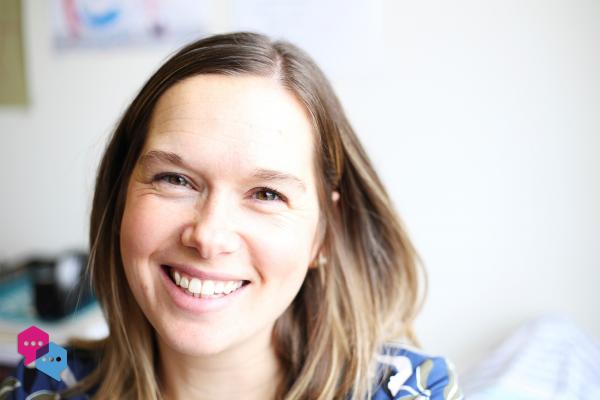
Faculty Fellow Profile: Clare Harrop
Developmental psychologist Clare Harrop, PhD, orients her research within this quote from the late renowned developmental psychologist Annette Karmiloff-Smith, “Development itself is the key to understanding developmental disorders.” This has led Harrop, a faculty fellow at the UNC Frank Porter Graham Child Development Institute (FPG) and an associate professor in Carolina’s Department of Health Sciences, to study autism as a condition that evolves and changes with development and across key developmental periods.
Harrop’s program of research broadly focuses on the experiences and profiles of autistic females across the lifespan. While for many years her research focused mostly on children, it has progressed to also include both young and older women.
One of her current projects is the Sex, Gender, and Camouflage in Autism Spectrum Disorder: A Multimodal, Accelerated Longitudinal Design Study. The Sex and Gender in Autism (SAGA) Study, a five-year longitudinal study that began in 2021, examines sex differences in the development of four- to eight-year-old children with and without a diagnosis of autism. Funded by the Eunice Kennedy Shriver National Institute of Child Health and Human Development, the study is a collaboration among UNC, Children’s Hospital of Philadelphia, and Children’s National Hospital.
For this project, Harrop and her colleagues use a multi-informant, multimodal approach, which provides breadth and depth of data. Study participants complete developmental assessments, parent report, play-based tasks with parents and researchers, and eye tracking. In addition, the more than 260 male and female participants seen to date—who are studied during four visits over the course of 18 months—talk about their friends, the things they like to do, and how they feel about themselves as a girl or boy.
Since males are diagnosed with autism at a rate three and a half times higher than females, Harrop is interested in how the trajectories of females differ from males who comprise the majority of autism research. The SAGA study seeks to address the lack of longitudinal research in order to understand how and when females differ from their male peers.
Harrop is also leading a study, funded by the Eagles Autism Foundation, looking at challenging eating behaviors, which are very common in children with autism. She says that she is interested in this from the perspective of sex differences, exploring whether early childhood eating challenges predict later outcomes such as eating disorders, which are more common in females, and potentially in autistic females. As with the SAGA study, Harrop and her team—which includes FPG Research Scientist Sallie Nowell, PhD—are using an approach comprised of multiple methods including eye tracking, taking videos of children participating in a snack-related task, and collecting food diaries.
Harrop is collaborating with FPG faculty fellows Dara Chan, ScD, CRC and Laura Klinger, PhD, on a study at the late age of the age spectrum. They are looking at how social connections and community support protects autistic older adults, age 55 and over, against suicidal thoughts and behaviors. Again, this project is oversampling for autistic females.
In addition, Harrop recently received funding to study the experiences of autistic women going through perimenopause. This research resulted from Harrop’s participation in the 2023 UNC TEACCH Autism Program conference. After Harrop gave a talk, an autistic woman came up to Harrop to ask her about her work with older women with autism. They ended up working on the recently funded proposal and the woman is part of Harrop’s research team for this project. “My work has evolved over time,” said Harrop. “I always tell my students that they should be open to where your research will take you because mine is not where I thought it would go.”
The common thread in Harrop’s research is examining key developmental and life transitions that are often pivot points, whether that is transitioning from adolescence to adulthood or going through reproductive changes and transitions. This has been understudied in autistic females, a lack that Harrop is committed to addressing. She is also committed to disseminating her findings broadly so that her research can be translated to interventions, clinical practice and supports that are appropriate for females.
Harrop became an FPG faculty fellow about a year after becoming faculty at UNC in 2018. But her connection to FPG started earlier since Brian Boyd, PhD, who is now FPG’s director, served as Harrop’s postdoc mentor. Harrop said that she was drawn to FPG because it represents child development research at its best. She said that being a faculty fellow has opened her eyes to the breadth of FPG’s work, which goes beyond research and into dissemination and policy work.
She has provided input to FPG’s future through her service on the developmental disability and mental health planning group of FPG Next. This initiative, created in 2024 by Boyd, provided a roadmap to guide the next three years of work at the Institute. She is pleased to see the progress of the work and how it has led to seed funding for FPG faculty and researchers.
Harrop appreciates that FPG brings in a diverse slate of speakers. After a talk last year by distinguished developmental psychologist Koraly Edgar-Pérez, Harrop reached out to her to find out more about her eye tracking work using glasses, which she was eager to learn about. Harrop said that the FPG talk gave provided an opening to reach out to Edgar-Pérez, which resulted in further connections to Edgar-Pérez’s team and ultimately a pilot grant proposal with one of her former trainees. Through Edgar-Pérez’s connections, Harrop has connected to others working in the autism field. “As we grow our work, we can collaborate together,” said Harrop. “FPG helps me get exposed to people like her who are doing such phenomenal work.”
